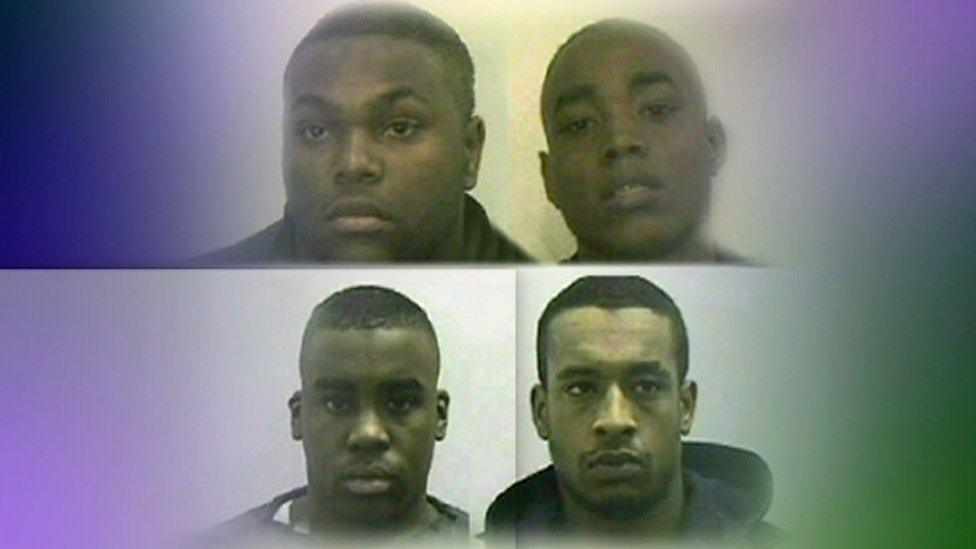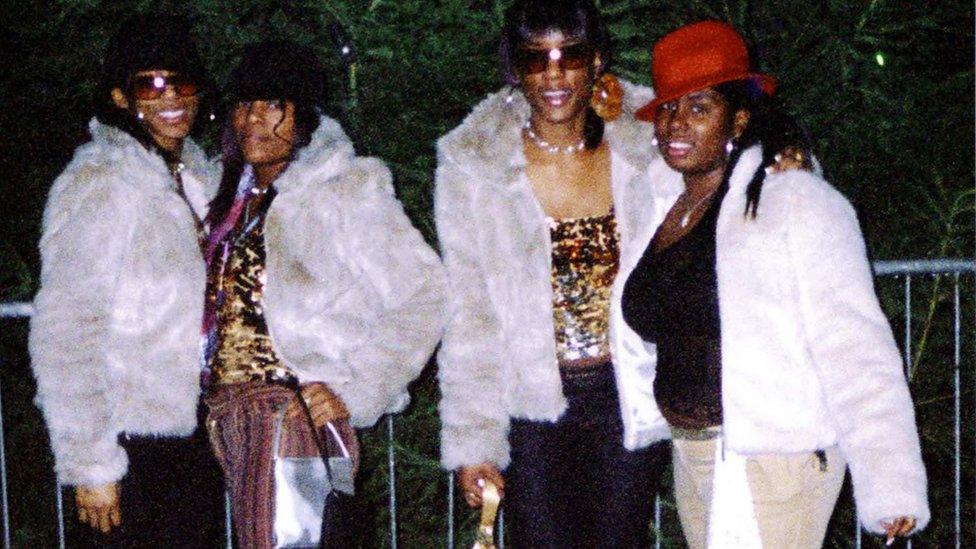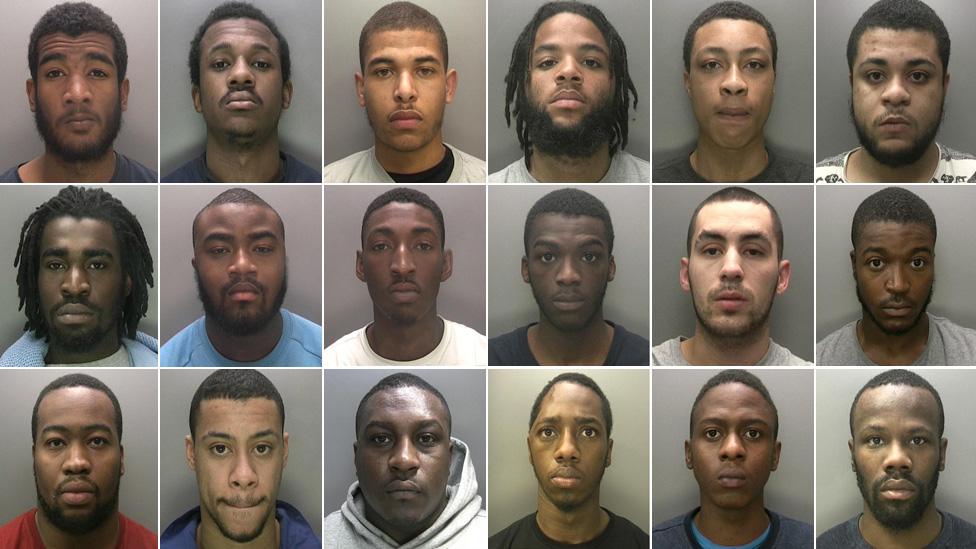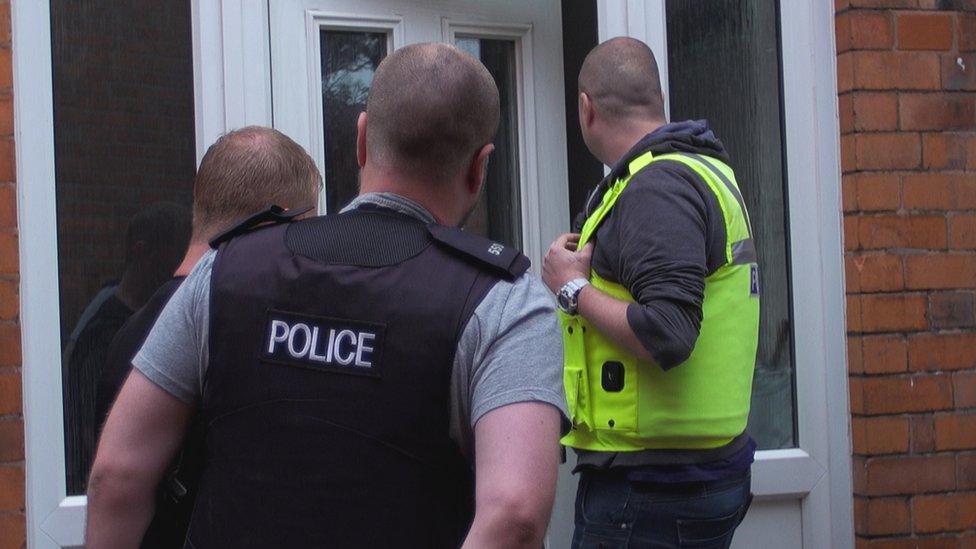Birmingham gangs: How two rivals poisoned a city's streets
- Published

(L-r) Michael Gregory, Nathan Martin, Marcus Ellis and Rodrigo Simms were jailed for life for the 2003 new year shootings
Eighteen men have been served injunctions by police trying to disrupt gang activity between rival Birmingham factions, the Johnson Crew and Burger Bar Boys.
But what is the history of the two gangs and how have they managed to tighten their grip on the city's streets?
The cold-blooded murders of two girls at a new year party in Birmingham in 2003 was the moment their feud became national news.
But before the deaths of innocent victims, Charlene Ellis, 17, and Letisha Shakespeare, 18, it was the targeting and killing of opposing members from within the groups that led to an escalation in the gang war.
The gangs took their names from two cafes in Handsworth where black youths congregated in the late 80s and early 90s.
Legend has it that they were once friends but fell out over a bet on who won a game of Streetfighter on the Playstation.
'Disregard for life'
The Burgers - whose territory included Smethwick and Handsworth - were said to be the richer and more organised of the two, with a stronger and more deadly collection of weapons.
But the Aston and Lozells-based Johnson Crew, or Johnnies as they were also known, had more members and splinter groups including the Cash Money Crew and the Raiders.
Police categorised both gangs as being involved in local drug dealing, robberies, and kidnappings before shootings started taking place outside nightclubs and community centres.
BBC Midlands Today correspondent Peter Wilson said: "The killings began in the last days of 1995 as these young men fought off Yardie gangsters.
"They copied the Jamaican gangs' ruthless disregard for life and reckless use of guns and violence."
Before long, as their influence grew, court cases against the Burgers and Johnnies started to collapse amid allegations of witness intimidation.

The friends - Cheryl Shaw, 17, twins Charlene Ellis and Sophie Ellis, 18, and Letisha Shakespeare, 17 - all went out together at new year
It was the unsolved murder of Cory Wayne Allen, who had links with both gangs, in 1999 that led to West Midlands Police launching Operation Ventara to build up a picture of gang-based intelligence in the city.
But the shootings continued. And the December 2002 killing of Burger Bar member Yohanne Martin in West Bromwich took the feud to a new and even more chilling level.
Yohanne - whose street name was "13" - was a key member of the gang and his brother Nathan - whose street name was "23" - believed the Johnson Crew were behind his brother's death.
On 31 December, Nathan and other Burgers members bought a red Ford Mondeo and, less than 48 hours later, drove up to a new year party at a hairdresser's in Aston and opened fire on partygoers, killing Charlene and Letisha and injuring two others.
The real targets were a group of young men standing nearby, who included an alleged member of the Johnson Crew.

The injunctions issued last month stop the men from contacting each other and entering the city centre
The girls' death shocked many, not just within the city. Both gangs were now notorious nationwide.
Two years later, Nathan Martin, Michael Gregory, Marcus Ellis - the half-brother of Charlene - and Rodrigo Simms were convicted of their murder and jailed for life.
The lengthy sentences and expert mediation that had been going on behind the scenes helped to gradually quell the bloodshed after that.
In 2009, the officer in charge of tackling the gang problem in the city, Ch Supt Tom Coughlan, boldly predicted that street gangs would be eradicated within two to three years.
While that did not happen, the force's work was bolstered by the creation of a gangs task force in 2011 aiming to disrupt some 45 urban street gangs that were said to be operating in the West Midlands.
Dismantled
Some reformed gang members from both sides also contributed and came together to establish a group to help persuade youths to get out of the gang lifestyle.
But in recent years, cuts have been felt within council and police budgets, and with gun crime statistics falling, many of the anti-gun crime initiatives were dismantled.
In the last two years, gun crime has re-emerged in Birmingham and become a familiar problem for the police, politicians and innocent residents of the second city.
And while a helpful step forward, these latest injunctions shine a light on the city's gangland problem - and prove that both groups still cast a shadow on the streets.

West Midlands Police visited properties on Wednesday to serve injunctions
- Published23 August 2017
